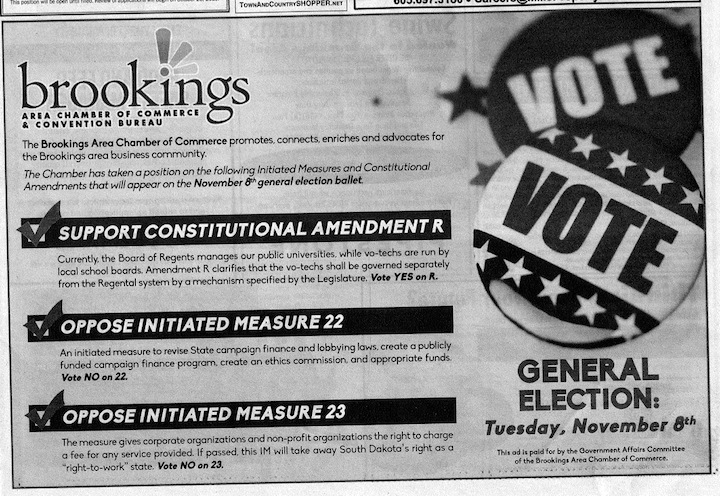…Silent on Payday Lending and Youth Minimum Wage
The Brookings Area Chamber of Commerce has the cash to buy a big chunk of the local paper to advocate on the ballot measures, but they only buy enough ink to cover three of the ten measures…

…and they only hint at a justification for their vote on one of them. The Brookings Chamber says Yes on Amendment R, the vo-tech governance measure, and No on Initiated Measure 22, the Anti-Corruption Act, but only describes them in relatively neutral terms. Only their negatory on IM 23, the fair-share union dues proposal, does the Chamber offer argument, saying somewhat clunkily that 23 “will take away South Dakota’s right as a ‘right-to-work’ state.”
(Those quote marks the Chamber uses on “right to work” get me thinking: if I have a “right to work,” why do I have to submit an application and win an interview to get a job? Why can an employer fire me?)
R and 23 perhaps pertain most directly to the business interests of Chamber members. That the Chamber chooses to step out on the political reform of 22 signals the Chamber’s interest in protecting its lobbying interests in Pierre and perhaps its interest in keeping the decks clear for Secretary Krebs’s pending campaign finance reform package, which, perhaps most importantly for Chamber members, may allow businesses to contribute directly to candidates.
The Brookings Chamber remains silent on the two ballot measures that would directly the business of payday lending, the real 36% rate cap of Initiated Measure 21 and the fake 18% rate cap of Amendment U. The Sioux Falls Chamber at least has the decency to call out Amendment U as a fake rate cap and urge a NO on U.
And perhaps most tellingly, the Brookings Chamber does not mention the most far-reaching business regulation on the ballot, Referred Law 20, the Novstrups’ youth minimum wage cut. If we could expect anyone in the state to exert itself in favor of a law that could help businesses save money, it would be the Chamber of Commerce. But the Brookings Chamber apparently recognizes that saying, “Let’s cut kids’ paychecks!” risks too much political capital and, in the current tight labor market, probably wouldn’t save them any capital capital.
It would be interesting to know how much each local Chamber of Commerce gets in public tax dollars to support their local organization.
Cory, correction — this ad was in the Town and Country Shopper dated October 26, a weekly publication, and in the Brookings Register.
Thanks for that update, Lawrence!
They think scabs should get a pass in the work place.
Perhaps the reason the chamber chose not to take a position on the youth minimum wage bill was because it is a non-issue. With our workforce development issues, most businesses already pay above the minimum wage.
Reasonable, LSC… but then that would lead us to ask why the SDGOP bothered to cut the youth minimum wage in the first place. Why gamble that political capital on a policy that almost no businesses will use in the current economic climate? Do any of the economic arguments for this cut make sense in the current SD economic climate?